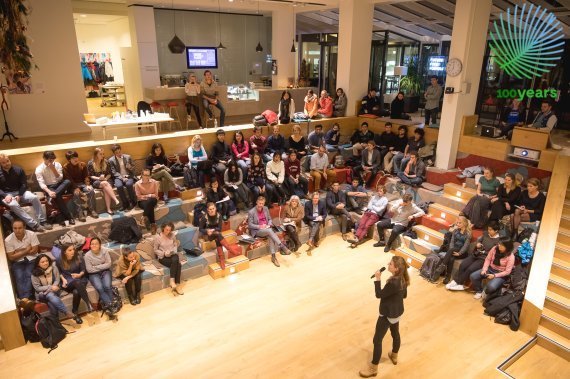©Sven Menschel
Green Spark, Panta Rhei, Green Wurks, Ever Green, Tardigrade Consultants and Technotitlan were the teams that made it to this round of the competition. All six teams presented remarkable diversity in terms of their studies and nationalities. The evening started off with words of encouragement from the jury members, after which the teams proceeded to present their pitch. Each team was given five minutes to convince the jury that their ideas were indeed worthy of receiving support from the University. Solution-based thinking, techno-economic feasibility and attention to community needs were central to each team’s proposal. The teams spoke about possible designs, their industry and academic connections, work and financial plans, and highlighted certain aspects that make their team unique. The teams truly reflected WUR’s international and transdisciplinary outlook.
‘We want to include an element of therapeutic landscape to aid rehabilitation of the former inhabitants of this quarter’, says Laetitia Boon from the Tardigrade Consultants team. The Tardigrade team is the smallest of the six teams and, interestingly, is the only all-female group with social sciences at its core. The Technotitlan, on the other hand, are a mostly Mexican team. ‘Our biggest challenge is that we’re from another continent and that sometimes, assessing the community’s need is challenging for us’, says the team as its members express immense confidence about overcoming this obstacle.
All teams were evaluated by Arnold Bregt, dean of education at WUR; Sebastian Berendse, head of knowledge valorisation at WUR; and Nettie Buitlaar, an independent entrepreneur in the field of biotechnology. The event was hosted by Marta Eggers from the Green Office and project coordinator Rio Pals. The jury was impressed by the effort put in by all the teams and announced that each of the teams will receive €5000 as starting money, €2500 in the form of knowledge vouchers and €500 in form of coaching vouchers. Besides this, they will also receive access to work space and lectures to materialise their plans over the next eight months.
These teams will compete with several other international teams to transform the Bajes Kwartier from an area with anti-social elements and a high crime rate into a liveable community housing project. The envisioned greenhouse will be used for producing food for the community, encouraging a green living, and promoting self-sufficiency in an urban environment.

